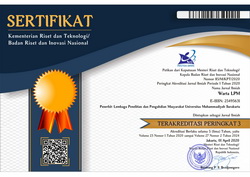Strengthening the Subjective Well-being of People Living with HIV Through Gratitude Intervention in the Mahakam Plus Peer Support Group in Samarinda City
DOI:
https://doi.org/10.23917/warta.v28i2.10462Keywords:
gratitude, PLHIV, subjective well-beingAbstract
People Living with HIV (PLHIV) often find themselves trapped in negative emotional states, such as feelings of distress and loss of life purpose. They frequently experience shame, marginalization, and a lack of motivation due to the stigma attached to their condition. These circumstances tend to hinder the achievement of optimal subjective well-being for PLHIV. Gratitude intervention is one program that can be implemented to enhance the subjective well-being of PLHIV. This community service program aims to improve the subjective well-being of PLHIV through gratitude intervention. The method used in this activity is Participatory Action Research (PAR), involving the active participation of 30 participants, including stakeholders, the Mahakam Plus KP team, and PLHIV at every stage of the program, from building rapport, conducting a needs assessment, planning the program, implementing it, assigning tasks, and evaluating outcomes. The intervention sessions include introductions, material presentations, video viewing, and gratitude journaling. The results indicate that after participating in the gratitude intervention program, PLHIV feel more grateful and are better able to accept their condition. Therefore, this program needs to be conducted continuously to consistently support the subjective well-being of PLHIV.
Downloads
References
Adhiningtyas, N. P., & Utami, M. S. (2020). Gratitude Cognitive Behavior Therapy untuk Meningkatkan Kualitas Hidup pada Perempuan dengan HIV/AIDS. Gadjah Mada Journal of Professional Psychology (GamaJPP), 6(1), 92. https://doi.org/10.22146/gamajpp.54234
Amare, T., Getinet, W., Shumet, S., & Asrat, B. (2018). Prevalence and associated factors of depression among PLHIV in Ethiopia: Systematic review and meta‐analysis, 2017. Wiley Online Library, 2018. https://doi.org/10.1155/2018/5462959
Anggraini, D., & Palupi, L. (2020). Relationship between gratitude and psychological well-being around Lapindo Mudflow resident. E3S Web of Conferences, 153, 3005. https://doi.org/10.1051/e3sconf/202015303005
Asmarani, F. F., & Sugiasih, I. (2020). Kesejahteraan Psikologis pada Ibu yang Memiliki Anak Tunagrahita Ditin jau dari Rasa Syukur dan Dukungan Sosial Suami. Psisula: Prosiding Berkala Psikologi, 1(0), Article 0. https://doi.org/10.30659/psisula.v1i0.7688
Boggio, P. S., Giglio, A. C. A., Nakao, C. K., Wingenbach, T. S. H., Marques, L. M., Koller, S., & Gruber, J. (2020). Writing about gratitude increases emotion-regulation efficacy. The Journal of Positive Psychology, 15(6), 783–794. https://doi.org/10.1080/17439760.2019.1651893
Cai, S., Liu, L., Wu, X., Pan, Y., Yu, T., & Ou, H. (2020a). Depression, anxiety, psychological symptoms and health-related quality of life in people living with HIV. Taylor & FrancisS Cai, L Liu, X Wu, Y Pan, T Yu, H OuPatient preference and adherence, 2020•Taylor & Francis, 14, 1533–1540. https://doi.org/10.2147/PPA.S263007
Cai, S., Liu, L., Wu, X., Pan, Y., Yu, T., & Ou, H. (2020b). Depression, anxiety, psychological symptoms and health-related quality of life in people living with HIV. Taylor & FrancisS Cai, L Liu, X Wu, Y Pan, T Yu, H OuPatient preference and adherence, 2020•Taylor & Francis, 14, 1533–1540. https://doi.org/10.2147/PPA.S263007
Carmen, C., & Boțu, G. (2019). Associations Between Prosocial Behaviours, Gratitude, and Psychological Well-Being in Vulnerable Adolescents with Mild Intellectual Disabilities. Educatia 21, 8. https://doi.org/10.24193/ed21.2019.17.08
Cooper, R. E., Saunders, K. R. K., Greenburgh, A., Shah, P., Appleton, R., Machin, K., Jeynes, T., Barnett, P., Allan, S. M., Griffiths, J., Stuart, R., Mitchell, L., Chipp, B., Jeffreys, S., Lloyd-Evans, B., Simpson, A., & Johnson, S. (2024). The effectiveness, implementation, and experiences of peer support approaches for mental health: A systematic umbrella review. BMC Medicine, 22(1), 72. https://doi.org/10.1186/s12916-024-03260-y
Cornish, F., Breton, N., Moreno-Tabarez, U., Delgado, J., Rua, M., de-Graft Aikins, A., & Hodgetts, D. (2023). Participatory action research. Nature Reviews Methods Primers 2023 3:1, 3(1), 1–14. https://doi.org/10.1038/s43586-023-00214-1
Coursaris, C. K., & Liu, M. (2009). An Analysis of Social Support Exchanges in Online HIV/AIDS Self-Help Groups. Computers in Human Behavior, 25(4), 911–918. https://doi.org/10.1016/j.chb.2009.03.006
Cregg, D. R., & Cheavens, J. S. (2021). Gratitude Interventions: Effective Self-help? A Meta-analysis of the Impact on Symptoms of Depression and Anxiety. Journal of Happiness Studies, 22(1), 413–445. https://doi.org/10.1007/s10902-020-00236-6
Cunha, L. F., Pellanda, L. C., & Reppold, C. T. (2019). Positive Psychology and Gratitude Interventions: A Randomized Clinical Trial. Frontiers in Psychology, 10, 584. https://doi.org/10.3389/fpsyg.2019.00584
Czyżowska, N., & Gurba, E. (2022). Enhancing Meaning in Life and Psychological Well-Being Among a European Cohort of Young Adults via a Gratitude Intervention. Frontiers in Psychology, 12, 751081. https://doi.org/10.3389/fpsyg.2021.751081
Devy, O. C., & Sugiasih, I. (2018). Kesejahteraan psikologis pada remaja perempuan korban kekerasan dalam pacaran ditinjau dari rasa syukur dan harga diri. Proyeksi: Jurnal Psikologi, 12(2), 43–52.
Dewi, L., Tentama, F., & Diponegoro, A. M. (2020). Analysis of Validity and Reliability of the Subjective Well-being Scale. American Research Journal of Humanities Social Science (ARJHSS), 3(6), 122–131.
Earnshaw, V. A., Bogart, L. M., Dovidio, J. F., & Williams, D. R. (2013). Stigma and racial/ethnic HIV disparities: Moving toward resilience. American Psychologist, 68(4), 225–236. https://doi.org/10.1037/a0032705
Eaton, R. J., Bradley, G., & Morrissey, S. (2014). Positive predispositions, quality of life and chronic illness. Psychology, Health & Medicine, 19(4), 473–489.
Emlet, C. A., & Brennan‐Ing, M. (2020). Is There no Place for Us? The Psychosocial Challenges and Rewards of Aging with HIV. Journal of Elder Policy, 1(1), 69–95. https://doi.org/10.18278/jep.1.1.4
Fauk, N. K., Gesesew, H. A., Mwanri, L., Hawke, K., & Ward, P. R. (2023). Understanding the quality of life of people living with HIV in rural and urban areas in Indonesia. journals.plos.orgNK Fauk, HA Gesesew, L Mwanri, K Hawke, PR WardPloS one, 2023•journals.plos.org, 18(7 July). https://doi.org/10.1371/JOURNAL.PONE.0280087
Gray, Mel., Webb, S. A., & Midgley, J. O. (2012). The SAGE Handbook of Social Work. 1–808.
Hidayati, D. L., Purwandari, E., Ridho, M., & Hidayanti, N. (2024). Gratitude as a Mediator of the Relationship Between Emotional Intelligence and Social Support on Psychological Wellbeing Among People Living with Human Immunodeficiency Virus (HIV). Islamic Guidance and Counseling Journal, 7(1).
Hizbullah, K., & Mulyati, R. (2022). The Role of Gratitude and Family Support on Psychological Well-Being of Mothers with Autistic Children. International Journal of Islamic Educational Psychology, 3(1), 1–18. https://doi.org/10.18196/ijiep.v3i1.13190
Hutahaean, B. S. H., Stutterheim, S. E., & Jonas, K. J. (2023). Barriers and facilitators to HIV treatment adherence in Indonesia: Perspectives of people living with HIV and HIV service providers. Tropical Medicine and Infectious Diseas. https://doi.org/10.3390/tropicalmed8030138
Iqbal, N., & Dar, K. A. (2022). Gratitude Intervention and Subjective Well-Being in Indian Adolescents: Examining the Moderating Effects of Self-Esteem. Child Indicators Research, 15(1), 263–278.
Jiang, H., Chen, G., & Wang, T. (2017). Relationship Between Belief in a Just World and Internet Altruistic Behavior in a Sample of Chinese Undergraduates: Multiple Mediating Roles of Gratitude and Self-Esteem. Personality and Individual Differences, 104, 493–498. https://doi.org/10.1016/j.paid.2016.09.005
Kemenkes. (2024). Laporan Ekstekutiv Pengembangan HIV, AIDS, dan PIMS.
Kerry, N., Chhabra, R., & Clifton, J. D. W. (2023). Being Thankful for What You Have: A Systematic Review of Evidence for the Effect of Gratitude on Life Satisfaction. Psychology Research and Behavior Management, 16, 4799–4816. https://doi.org/10.2147/PRBM.S372432
Kirca, A., M. Malouff, J., & Meynadier, J. (2023). The Effect of Expressed Gratitude Interventions on Psychological Wellbeing: A Meta-Analysis of Randomised Controlled Studies. International Journal of Applied Positive Psychology. https://doi.org/10.1007/s41042-023-00086-6
Kong, F., Ding, K., & Zhao, J. (2015). The Relationships Among Gratitude, Self-esteem, Social Support and Life Satisfaction Among Undergraduate Students. Journal of Happiness Studies, 16(2), 477–489. https://doi.org/10.1007/s10902-014-9519-2
Kusumaningrum, T. A. I., Kusumawati, Y., Indriawan, T., Saputri, M. W., Pebrianti, S., & Liswanti, A. L. (2021). Pembentukan Peer Educator dalam Upaya Diseminasi Informasi Pencegahan Perilaku Berisiko HIV pada Siswa. Warta LPM: Media Informasi dan Komunikasi Hasil Pengabdian Kepada Masyarakat, 24(4), 677–686.
Lai, S., Zhou, J., Xu, X., Li, S., Ji, Y., Yang, S., Tang, W., Zhang, J., Jiang, J., & Liu, Q. (2022). Subjective well-being among AIDS orphans in southwest China: The role of school connectedness, peer support, and resilience. BMC Psychiatry, 22(1), 197. https://doi.org/10.1186/s12888-022-03833-2
Lazarus, J. V, Safreed-Harmon, K., Barton, S. E., Costagliola, D., Dedes, N., Del Amo Valero, J., Gatell, J. M., Baptista-Leite, R., Mendão, L., Porter, K., Vella, S., & Rockstroh, J. K. (2016). Beyond viral suppression of HIV – the new quality of life frontier. BMC Medicine, 14(1), 94, s12916-016-0640–0644. https://doi.org/10.1186/s12916-016-0640-4
Li, Q., Liu, M., Wang, H., Chen, Y., & Fu, Z. (2024). Longitudinal Associations of Gratitude with Subjective Well-Being and Psychological Well-Being: A Two-Wave Study. Applied Research in Quality of Life. https://doi.org/10.1007/s11482-024-10406-w
Litwin, H. (2010). Social Networks and Well-being: A Comparison of Older People in Mediterranean and Non-Mediterranean Countries. The Journals of Gerontology Series B: Psychological Sciences and Social Sciences, 65B(5), 599–608. https://doi.org/10.1093/geronb/gbp104
Mutumba, M., Bauermeister, J. A., Musiime, V., Byaruhanga, J., Francis, K., Snow, R. C., & Tsai, A. C. (2015). Psychosocial Challenges and Strategies for Coping with HIV Among Adolescents in Uganda: A Qualitative Study. AIDS Patient Care and STDs, 29(2), 86–94. https://doi.org/10.1089/apc.2014.0222
Oladunni Taiwo, M., & Bickersteth, F.-T. (2017). Association between Psychological Wellbeing and Antiretroviral Therapy Adherence in North-Central, Nigeria. American Journal of Applied Psychology, 5(1), 18–24. https://doi.org/10.12691/ajap-5-1-4
Research, R. B.-A. J. of A., & 2009, undefined. (2009). The mental health of people living with HIV/AIDS in Africa: A systematic review. Taylor & Francis, 8(2), 123–133. https://doi.org/10.2989/AJAR.2009.8.2.1.853
Saputra, R., Waluyo, A., & Edison, C. (2024). The Relationship between Distress Tolerance and Spiritual Well-Being towards ARV Therapy Adherence in People Living with HIV/AIDS. mdpi.comR Saputra, A Waluyo, C EdisonHealthcare, 2024•mdpi.com. https://doi.org/10.3390/healthcare12080839
Silvi, R. (2018). Analisis Cluster dengan Data Outlier Menggunakan Centroid Linkage dan K-Means Clustering untuk Pengelompokkan Indikator HIV/AIDS di Indonesia. Jurnal Matematika MANTIK, 04(01). https://doi.org/10.15642/mantik.2018.4.1.22-31
Thompson, D. M., Booth, L., Moore, D., & Mathers, J. (2022). Peer support for people with chronic conditions: A systematic review of reviews. BMC Health Services Research, 22(1), 427. https://doi.org/10.1186/s12913-022-07816-7
Utama, W. D. (2023). The Relationship of Peer Social Support and Gratitude Towards the Meaningfulness of Life of People with HIV / AIDS (PLWHA). Basic and Applied Nursing Research Journal, 4(2), 55–60. https://doi.org/10.11594/banrj.04.02.01
Wu, Y.-J., & Lee, J. (2022). The most salient global predictors of adolescents’ subjective Well-Being: Parental support, peer support, and anxiety. Child Indicators Research, 15(5), 1601–1629. https://doi.org/10.1007/s12187-022-09937-1
Zurbachew, Y., Hiko, D., Bacha, G., & Merga, H. (2023). Adolescent’s and youth’s adherence to antiretroviral therapy for better treatment outcome and its determinants: Multi-center study in public health facilities. AIDS Research and Therapy, 20(1), 91. https://doi.org/10.1186/s12981-023-00588-y
Downloads
Submitted
Accepted
Published
How to Cite
Issue
Section
License
Copyright (c) 2025 Warta LPM

This work is licensed under a Creative Commons Attribution 4.0 International License.














